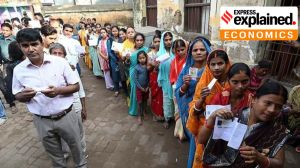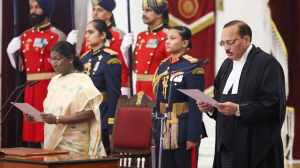A village cries for a man Cong forgot
Every morning, a disparate group of men and women meets over tea here and sits silently, in a bond of mourning and anger. Fifteen minutes la...

Every morning, a disparate group of men and women meets over tea here and sits silently, in a bond of mourning and anger. Fifteen minutes later, the emotions erupt: “Why did this have to happen? Whom can we identify with now? He wasn’t wrong alone.”
This is Vangara, perhaps the only place in the country willing to identify with a friendless scholar-politician whose long career ended amid turbulence that amazed even his foes. P.V. Narasimha Rao, the former prime minister who overturned half a century of policies on their head, is now triggering off a range of feelings in his native village — an ability rarely associated with him.
When news came of Sitaram Kesri’s public guillotining of Rao’s career over the Babri Masjid demolition, Vangara went into a sulk. It has since emerged to announce a boycott of the 1998 elections in protest against Rao’s summary political execution. But the questions fly thick and fast.
The village where Rao was born in 1921 is still way behind in development and desperatelyneeds a shot of time, inclination and money from its MP to revive itself. Curiously though, the roof of the local trader’s house is crammed with three dish antennae. Apparently, he provides five channels a day to the villagers at Rs 30 a month.
That apart, nothing speaks for Vangara, though Rao’s “ardent follower” G. Venkatswamy, who harbours visions of himself as the president of the country, has been voted to Parliament faithfully by the people here (part of the Peddapalli reserved constituency) for 20 years.
Till 1996, Venkatswamy periodically reminded the world of his proximity to Rao: it was then an important thing to bandy around. Now, he tries hard to be as far away from Vangara. He ventured once within 10 km of this place and was hounded by questions on why he didn’t stick by Rao.
“If you tell me to do something and I don’t, I am to be blamed, not you. How can P.V. be held solely guilty?” asks Linga Reddy, a daily wager. Next to him is Tirupathi Reddy, a landowner who is socially poles apartfrom Linga Reddy. Yet, they feel the same. “We warned him not to trust all these people. If he had returned to active politics, Kesri’s game would have been over. Kesri knew it and quickly pushed Rao out. They have robbed us of our pride,” laments the landowner.
Vangara has about 4,000 people, around 1,500 of them women. Not even 600 back the Telugu Desam Party (TDP), but this time the party supporters are already gleeful. “Go ahead, boycott the election. We will win for the first time from here,” taunts Ramachandraiah, a TDP supporter who sees 600-plus votes for the TDP when the ballot boxes are opened.
That will not be enough to affect what appears to be a foregone victory for Venkatswamy but at least it will place on record that Rao was mourned. The former premier only once came here as boss, in 1994. Today, the courtyard where Rao once gambolled as a child is host to a bored CRPF battalion. They were pushed here a day before Rao was sworn in as prime minister in 1991 and have remainedsince.
They have nothing to do, a fate the villagers sympathise with. And over endless cups of sugary tea, Kumaraswamy, the local barber, has become a good friend of the cops. On Rao, he gets emotional: “Kya karen sir, baap to baap hi hai na. Jaisa bhi ho, baap ko to maanna hi padega (a father is a father, however he may be, one has to respect him).”
Feelings which Rao’s own children have never aired. P.V. Rajeshwara Rao is fighting a desperate battle to retain his Lok Sabha seat from Secunderabad while P.V. Ranga Rao is aiming to get into the Andhra Pradesh Assembly in a by-election from Hanamkonda. Neither of them has once referred to their father.
In the end, this is probably what Rao will go down with: That strangers cried for him while his family wished he didn’t exist.



- 01
- 02
- 03
- 04
- 05




























